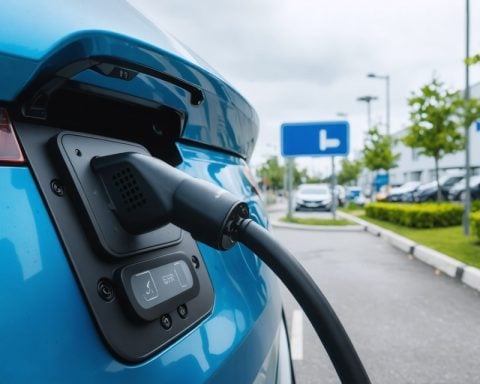Breakthrough Technology Poised to Transform the EV Landscape
In an era where the demand for sustainable transport solutions is surging, a new technological advancement is capturing the spotlight: solid-state batteries. These batteries, distinguished by their use of solid electrolytes, are set to redefine the electric vehicle (EV) experience, thanks to pioneering efforts by companies like Nio.
Unprecedented Range and Efficiency
One of the standout features of solid-state batteries is their exceptional energy capacity, allowing vehicles to travel distances exceeding 930 kilometers on a single charge. This technological leap not only enhances vehicle range but also slashes charging times, setting a new benchmark for EV convenience akin to traditional gasoline cars.
Redefining Safety and Sustainability
Solid-state batteries offer superior safety compared to their lithium-ion counterparts. By eliminating liquid electrolytes, these batteries reduce risks like leakage and overheating, paving the way for safer vehicle operations. This innovation also represents a significant step toward environmental sustainability. By enabling longer-lasting and more efficient energy solutions, solid-state batteries support the global shift towards reducing carbon footprints.
Impact Across Industries
The implications of this technology go beyond personal vehicles. Its enhanced features could revolutionize public transportation and commercial fleets, catalyzing widespread adoption of sustainable practices. As more automakers explore solid-state options, the landscape of automotive innovation is likely to accelerate.
The Road Ahead
As solid-state batteries gain traction, they promise to transform the EV market and public perception, making electric vehicles a more compelling choice for consumers accustomed to internal combustion engines. This paradigm shift not only highlights Nio’s innovation but sets the stage for a new era in automotive technology.
Are Solid-State Batteries a Game-Changer or a Pipe Dream?
As the world pivots toward cleaner energy solutions, solid-state batteries emerge as a potential savior in the electric vehicle (EV) domain. However, behind the excitement, intriguing controversies and challenges simmer for communities, consumers, and industries.
Community and Consumer Perspectives
While the hypothetical benefits of solid-state batteries include unprecedented range and increased safety, some communities question whether this technology might widen the accessibility gap. Advanced EVs equipped with cutting-edge batteries might remain unaffordable for many, particularly in developing regions, highlighting a disparity between technological innovation and real-world applicability. Furthermore, the cost and complexity of manufacturing solid-state batteries could impact pricing strategies, potentially alienating price-sensitive consumers.
Environmental Considerations
Solid-state batteries promise enhanced sustainability by reducing emissions and dependency on precious minerals. Yet, the question remains: Are the raw materials for such batteries truly abundant? Mining and sourcing new materials could pose fresh environmental challenges, leading critics to argue that current “green” labelling might be premature.
Market Impact: Revolution or Ripple?
For industries, solid-state batteries could mean a turning of the tide. Could commercial transport fleets and public buses soon operate on this technology, revolutionizing urban mobility? While promising, the infrastructure to support rapid adoption remains embryonic at best. The benefits may take years to trickle down meaningfully.
Conclusion: A Double-Edged Sword?
It’s vital to recognize both the potential and pitfalls of solid-state batteries. While they could redefine the transportation ecosystem, their path to integration is fraught with questions. Will solid-state technology truly democratize EVs, or will it remain the pinnacle of luxury innovation? Communities, industries, and policymakers must navigate these questions carefully. For more insight into evolving EV technologies, visit BBC.
The article has been updated: 2024-11-09 06:38
Here are some suggested related links for your post title “Solid-State Batteries: The Game-Changer Driving the Future of Electric Vehicles”:
1. Energy.gov – Explore the latest advancements in energy technologies, including innovations in battery technology and electric vehicles.
2. ScienceDirect – Access a wealth of research articles and papers focused on solid-state batteries and their applications in electric vehicles.
3. Automotive World – Stay updated on industry news and analysis regarding electric vehicles, including the impact of solid-state batteries.
4. Nature – Check out leading scientific research and reviews on battery technology and materials, with insights into solid-state developments.
5. Bloomberg – Read about the business and market implications of solid-state batteries in the electric vehicle sector through comprehensive articles and reports.
6. Forbes – Discover insights on the economic trends and innovations surrounding electric vehicles and solid-state battery technology.
7. TechCrunch – Find news and updates on tech innovations, including breakthroughs in electric vehicle battery technologies like solid-state batteries.
8. Wired – Engage with articles discussing the technological advancements and future potential of solid-state batteries in the electric vehicle market.
9. Electrek – Keep up with the latest news and developments in electric vehicles and related technologies, including solid-state batteries.
10. Reuters – Access up-to-date news articles covering the latest trends and breakthroughs in the electric vehicle industry, particularly focused on battery technology.
The article has been updated. 2024-11-09 20:10
How do solid-state batteries differ from traditional lithium-ion batteries and what advantages do they offer for electric vehicles?
Solid-state batteries differ from traditional lithium-ion batteries primarily in their electrolyte composition. While lithium-ion batteries use a liquid or gel electrolyte, solid-state batteries utilize a solid electrolyte. This fundamental change offers several advantages for electric vehicles (EVs), including:
1. Increased Energy Density: Solid-state batteries can store more energy in a smaller volume, potentially allowing for longer driving ranges without increasing battery size or weight.
2. Enhanced Safety: The solid electrolyte is less flammable than liquid electrolytes, reducing the risk of fires and increasing overall safety for EVs.
3. Faster Charging: Solid-state batteries can support higher charging speeds, which means shorter charging times for EVs, making them more convenient for everyday use.
4. Longer Lifespan: With reduced degradation over time and fewer chemical reactions degrading performance, solid-state batteries can offer longer cycle life compared to traditional lithium-ion batteries.
5. Wider Operating Temperature Range: Solid-state batteries can function effectively at extreme temperatures, making them more versatile across various climates.
Overall, the adoption of solid-state batteries has the potential to significantly enhance the performance, safety, and practicality of electric vehicles, positioning them as a game-changer in the industry.







